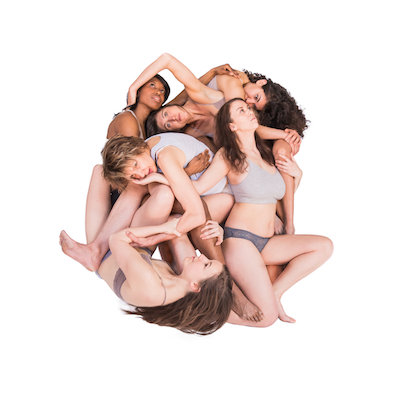 A new show in Toronto explores some of the many ways women fade from sight in our culture
A new show in Toronto explores some of the many ways women fade from sight in our culture
The late, great Southern writer Flannery O’Connor famously wrote “everything that rises must converge,” and I have always heard that sentence in the back of my mind when I see a piece of theatre that’s so emotionally specific and truthful that the experiences just shimmer up off the stage and, inevitably, converge with the audience’s experience (no matter how demographically different the audience member may be from the performer). Now You See Her, the new collaboration from Quote Unquote Collective, is exactly this kind of extraordinary work.
Six women, representing six locations of empowerment and disempowerment, tell stories through this piece – stories about work, family, violence, race, relative privilege, embodiment, age, sexuality and so much more. The narrative threads seem, at first, jumbled – like a first-grader started a friendship bracelet and then abandoned it to play – and mixed up with movement/dance, music, and even weather. As the work progresses, the threads cohere and tell a series of complex stories about choices.
It would be difficult to overstate how brilliantly realized and intricately crafted Now You See Her is. Everything means something, even the most casual choices are revealed to contribute to the braid of the story.
The six women who co-created the work – Amy Nostbakken, Norah Sadava, Lisa Karen Cox, Maggie Huculak, Raha Javanfar, and Cheyenne Scott – layer their stories and movements and observations and breaths of their characters onto one another. They are all engaged with questions of power, and how their personal empowerment might or might not be possible depending on their choices. Of course, this frame brings into stark relief how much women are made responsible for their own empowerment, and the degree to which every choice is interrogated internally and then externally.
The writing and physical performances of this work are superb, supremely crafted and evocative. I find it difficult to describe how many pieces there are to the entirety of each actor’s performance in Now You See Her, as each woman tells a story, plays an instrument, sings, dances, declaims, performs as the facilitator for the moments of other performers, and more.
I will say, as my way of trying to explain how intensely emotional and connected the work was, that when Norah Sadava – whose character is overwhelmed by the many many many tasks of parenting – began to display her mounting sense of being engulfed by the demands I actively struggled to stay in my seat. It was hard to remind my Dad-feelings that this was a play and we did not need to go take the baby for a while so she could get a break.
None of the characters in this show get a break. Slowly, the pressure builds for each – some conclusions have some relief and some are disastrous but with all the stories intertwined every joy is tinged with the loss of the others and every loss fractionally redeemed by the hope of better in the future. Now You See Her takes the audience somewhere and brings us back changed, and considerably grateful to have been. If you’re not sure what theatre is for, anymore, this show will restore your faith in the art form.
Details:
- Now You See Her plays until November 4th, 2018 at Buddies in Bad Times Theatre (12 Alexander St.)
- Shows run Tuesday-Saturday at 8:00PM and 2:30 on Saturday and Sunday with dates already sold out.
- Tickets are PWYC – $75 and can be purchased online, in person, or by calling 416-975-8555.
- The show features nudity, aggressive strobe light and audience blinders. Admittance is restricted to people 16+
Photo of Lisa Karen Cox, Maggie Huculak, Raha Javanfar, Amy Nostbakken, Norah Sadava and Cheyenne Scott, by Brooke Wedlock.
